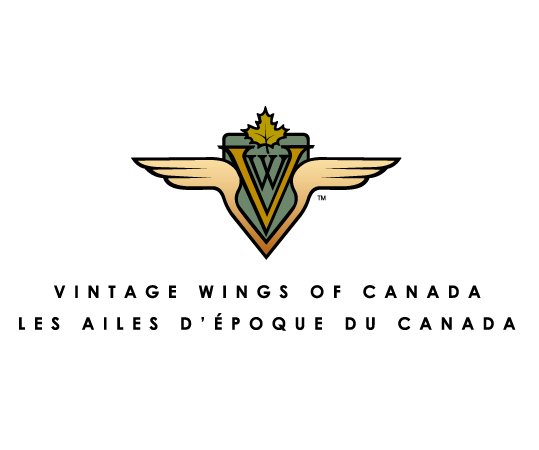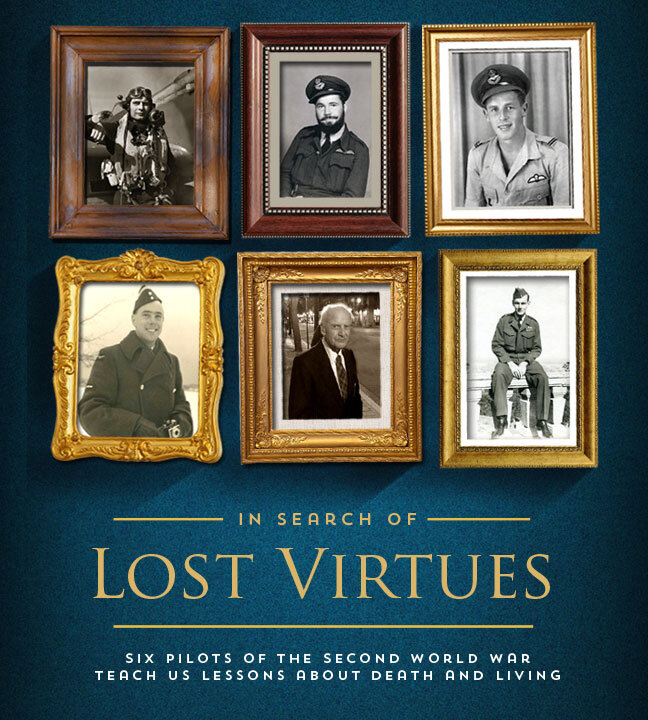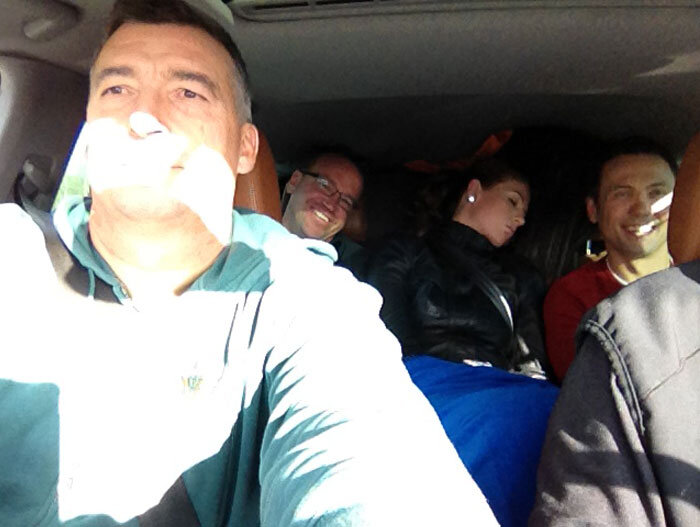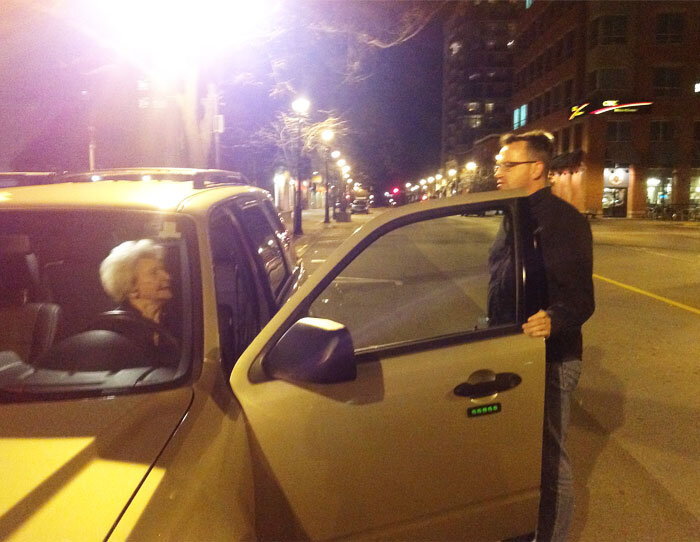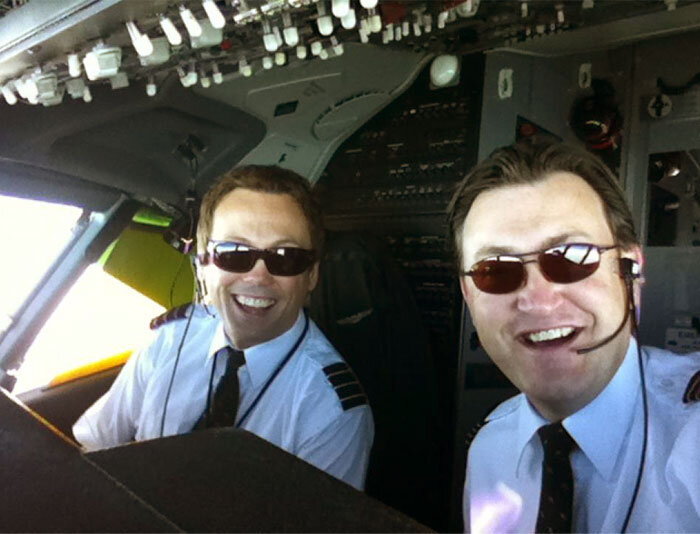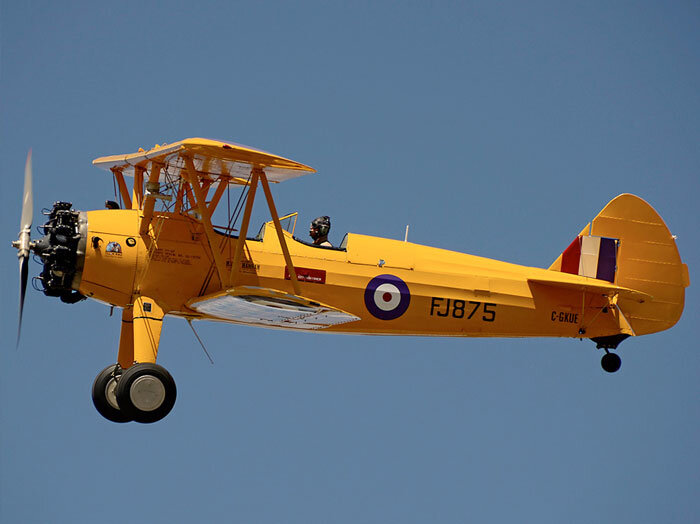OUR DINNER WITH HARRY
In the late winter of 1944-45, Warrant Officer Harry Hannah had been sitting, alone, with nothing to warm him but his thoughts, in a small, cold, and damp solitary confinement prison cell in Poland for the worst part of a year. Before that, he had spent another year as a prisoner of war at Stalag Luft 4. It doesn't take much of an imagination to figure out what he thought about to sustain himself through the long periods of abject loneliness – food, drink, friends, home, family, peace, flying, warmth, women, and a future that was quite possibly about to be taken away from him. I smile when I think that he could not possibly have imagined that all of these things would be given back to him and that, 70 years into that doubtful future, he would see them all come together on a cold and blustery night, far from Poland in a land he had, just a couple of years before, travelled through.
In May of 2012, the beautiful Yellow Wings Boeing PT-27 Stearman was dedicated to this elegant, quiet, and understated gentleman, in a moving ceremony at our Gatineau, Québec hangar. Following the ceremony, Stearman pilots Harry Hannah and Todd Lemieux strapped in together and lifted off into a beautiful Ottawa Valley sky to spend an hour getting to know each other. Todd's mission that afternoon was to fly Harry on a flight of remembrance. Instead, the young pilot handed over control to the nonagenarian, allowing himself to be taken on his own journey back in time. By the time they had landed, there was a strong bond between the two aviators.
Our theme for next year's flying season is “On the wings of history, go the leaders of tomorrow.” The idea is to reach young people through contact with veterans, our aircraft and our pilots, and to instill in them a deeper and more emotional understanding of the powerful concepts of duty, honour and sacrifice. This central theme was conceived after flying the Stearman out West and our other Yellow Wings aircraft down East during the summer following Harry's and Todd's flight. While we work to reach our youth and children with this message, we ourselves must understand, and be committed to, the power of the lessons of Harry and his generation.
On that flight, Harry, unknowingly, passed on this power to Todd, a half century younger than himself. This force, this strength, steeped in history, humility and heroism, was transmitted to him from Harry's gentle heart to Harry's hand on the control column, down that long wooden shaft to the linkages and cables, aft down the longerons, tubing and the thrumming fabric, through Todd's hand on the throttle and his feet on the rudder pedals, right to his own eager heart. Between them passed a powerful understanding – a bond of 70 years.
From that day on, the younger man felt a deep compulsion to call Harry, to strengthen that linkage, and to mine more of that powerful, sustaining spiritual ore. During the summer that followed, as he and the team at Vintage Wings West journeyed westward across the Prairies and even into the Rocky Mountains, Lemieux would enact an old Royal Canadian Air Force tradition – the Squadron Number Phone Call. This tradition dictates that old squadron mates call each other at a time which represents their unit's number. For instance, members of 441 Squadron will call to reconnect with each other at 0441 hours in the morning or, if they are kind, at 1641 hours in the afternoon. The old ritual required Todd to ring Harry, the former 602 Squadron pilot, and his wife Yvonne at home at 6:02 PM (1802 hours) local time and brief them on the progress of the Stearman's tour of the West. The Stearman pilots of Vintage Wings West would gather round Todd's cell phone and regale Harry with stories of their exploits, the skies they had flown, the girls they had met, the obstacles they had overcome.
At the age of 92, Harry Hannah got back in the saddle one more time. Here, pilot Todd Lemieux straps him in and gets set to hand the controls over to one of the Greatest Generation. Photo: Peter Handley
The dedication panel on the side of the Vintage Wings of Canada Boeing PT-27 Stearman. In 1941, Harry Hannah, then a young fitter with 602 City of Glasgow Squadron of the Auxiliary Air Force, sailed to Canada on a troopship, and rode by train, first to Toronto and then to Fort Erie, Ontario, where he crossed over to Buffalo, New York. As the United States was not yet a combatant in the Second World War, Harry could not cross in the uniform of the Royal Air Force. He was given a cheap grey suit and a cardboard suitcase and he entered the USA as a student. From the border city of Buffalo, he travelled by rail to far-off Mesa, Arizona to begin a year of flight training at the desert airfield known as Falcon Field. Falcon was an “all-through” training facility. Pilots, like Harry, would not only learn primary flying skills and solo here for the first time, they would go on to advance flying training on T-6 Texan aircraft (known as the Harvard in Canada) and graduate as fully winged pilots, ready for an Operational Training Unit (OTU) flying fighter aircraft. Photo via Yellow Wings website.
Harry Hannah flying the Yellow Wings Stearman over the Gatineau Hills in May of 2012 . Photo by Todd Lemieux
Related Stories
Click on image
On 5 May, the very beginning of our 2012 flying season, Todd Lemieux took Harry flying in “his” Stearman. Here, Harry walks toward his wife Yvonne (out of frame) after landing. Lemieux tells us that, at 400 feet above the ground, he handed over control of the Stearman to the old Falcon Field hand. From that point to 500 feet in the landing circuit, Harry flew the big biplane, stripping away 70 years in a few minutes and making beautiful coordinated turns all over the sky. Photo: Someone needs to remind me where I got this photo. I would like to credit it properly.
At one point in the summer, Lemieux made a promise that the crew would come to Harry's home town of Oakville, Ontario, in the autumn and take him and Yvonne out to dinner. There were several of the Stearman pilots who did not yet have the honour of meeting the man whose story they were committed to tell. As summer closed, and fall brought colder temperatures, a plan was put into place. The dinner would be the day after our Annual Members' Gala, held this year in Gatineau on 4 November. Everyone from the Western crew would try to make it, if their schedules allowed, and they would all journey by air to dine with Harry the following day. Plans change.
Even though I was not a member of the Western cadre, I invited myself to the dinner as Harry has been a close friend of mine for several years and I had championed him for the Stearman dedication honour. Since I was going to be in the area for the dinner, I also combined the trip with a visit to my daughter and granddaughter. I would go by car and invited anyone who wanted to sit with me for 6 hours to come along. As it turned out, all the Harry Hannah Stearman crew members who attended the Gala decided to come along for an old style college road trip – sans water bong, farting contests and Phil Collins on the tape deck.
Due to pilot scheduling, three of the Stearman pilots (Ron DuJohn, Gord Simmons and Liam O'Connor) were unable to attend the Gala, but the rest loaded into my car on Sunday morning. When four relatively tall men and a supermodel-like flight attendant wedge themselves into a Volkswagen, the leg room is decidedly at a premium, and movement about the “cabin” is non-existent. If the Western crew is anything at all, they are a cheerful and a non-complaining bunch. The scheduled six hour drone down Highway 401 turned, thanks to your “usual” Sunday afternoon traffic jam in Toronto, into an eight hour marathon of knee pain. As we sat frozen on the logjam, Lemieux quipped: “It could be worse, we could be that guy”, pointing to a sorry looking individual in the next lane, slumped forlornly in the back of a taxi, still five kilometers from his destination (the airport) with his eyes locked on the meter, just rolling through $78.00, and with no hope of getting change back from his $100 bill.
The day after the 2012 Vintage Wings of Canada end-of-year Members Gala, we loaded up the car and headed down Highway 401, bound for glory. There was a time when I thought my Volkswagen Touareg was a large vehicle, but once we were loaded with three Calgary cowboys, one sleepy supermodel-esque flight attendant, tiny little me, and all our gear, it seemed less so. Left to right: Bruce Evans, Todd Lemieux, Riki Lane Beal, and Dave Maric. iPad photo by Bruce Evans
Having been on the road all summer with the Harry Hannah Stearman, the Vintage Wings West crew know what fine dining was all about. Left to right Riki Lane Beal: (WestJet Flight Attendant and Yellow Wings ground support), Dave Maric (Stearman pilot and WestJet First officer), Todd Lemieux (Stearman pilot, oil magnate, Chairman of the Board of Vintage Wings, and Vintage Wings West director) and Bruce Evans (Stearman pilot and CEO of Calgary-based Firefly Aviation). iPad photo by Dave O'Malley
By the time we reached Burlington, Ontario, where the dinner was scheduled at an Italian bistro on one of the city's main streets, the skies were dark and the air was cold from proximity to Lake Ontario. Damp, near-zero wind blew hard down the streets, and we walked with hunched shoulders to the warmth of the cozy restaurant, there to await our honoured guests. We did not have long to wait because, of course, Harry and Yvonne were military-bred. When Harry arrived, with his bride on his arm, there was warm hugging and handshaking. I won't take you through the entire evening, but there was much talk, gifts to be presented from the 602 Squadron Museum Association, good food and excellent wine to be shared and photos to be taken.
More important than the details of this warm and special evening was the aura that surrounded the table that night. Gathered together were seven individuals, some who had never met each other before. The dinner started out warmly, but quietly, with Harry feeling perhaps a bit overwhelmed. He said little, which is his wont. Harry speaks only the exact words necessary to tell his story. He is not an embellisher, an exaggerator, or a line-shooter. He will answer your questions though – always preceeded by a moment of thought as he chooses his words. In the warm glow of the restaurant, surrounded by the chatter of diners, music and the sounds of crockery and silverware, he listened, deferring to the lead of others at the table. But not even Harry Hannah can resist the charm of Saskatchewan farm boy Todd Lemieux.
Before long, with Todd explaining how the summer out West had gone, the conversation drew Harry out. The Western crew leaned forward in their seats to hear him better but also to be closer. The wine flowed, the food came, the talk roamed around the seven decades since Harry's flying career and around the world with his postwar sales career with Ford Motors. We learned about Yvonne who was born in Trail, BC, the same small town as was Robert Hampton Gray, and knew his family.
I found myself leaning back, warmed by the wine and friendship, but pulling away from the group and watching the interactions from a figurative distance. I began to drift back in time, 70 years to Harry's cold prison cell, imagining him as a young man, in a situation that was, in every way, the polar opposite of the place we found ourselves this night. I thought about how Harry could easily have been much changed by this terrible and frightening experience; how he could have been a hard man, a bitter and unhappy human being. Though enduring the loneliness and the deprivation was a terrible hardship, Harry would consider himself lucky that he was alive, for his fate, as he has described, could have been much worse at a number of turns in his flying life.
One of the cannon shells that ripped apart his Spitfire's engine on the coast of France in 1943, could just as easily ripped apart his body. But it did not. When he tried to get out of his crippled Spitfire, the canopy jettison cable came free in his hand. He could just as easily have been trapped inside the dying Spit, but he managed to push the canopy back. He could just as easily have landed in the English Channel and drowned, but he did not. Instead he landed in the tidal mud flats of the Abbeville Canal and was captured.
On the night his mate and he had gone “under the wire” at the POW camp, he could just as easily have been shot when they were spotted trying to get back to camp with a camera stolen from a camp administration building. But he was not. He could just as easily have been executed for this part in the elaborate escape plan, but he was not. Instead he was shipped to Dresden, Germany, and put on trial. Here he could have been given three years hard labour, which would have been a death sentence, but instead a gallant German officer (his appointed lawyer) parlayed his sentence to a year in solitary. Awaiting transit to a prison, he was still in Dresden when the RAF put that beautiful city to the torch. He could just as easily have been dragged out into the street by an angry mob, but he was protected.
During the following year that he spent in solitary confinement, his subsequent liberation by Red Army soldiers and his dangerous overland and sea voyages of repatriation, Harry could have met a different and unhappy end. But he did not. He looked at everything with a positive mind. He was never mistreated, though his situation was harsh. Yes, Harry Hannah considers himself a lucky man.
At dinner, Harry was presented with a few memorable gifts from 602 Squadron Museum Association in Glasgow, Scotland. They made sure he had the latest 602, City of Glasgow Squadron tie, a publication outlining the remarkable history of this famous unit, and finally, a beautiful certificate, proclaiming Warrant Officer Harry Hannah a lifetime member of the Museum Association. The Museum Association's Honorary Secretary Roddy MacGregor told us that they had wondered for a long time what had happened to Harry and were delighted when the story of our Stearman's dedication reached them. iPad photo by Dave O'Malley
At the restaurant after dinner, Harry and his wife Yvonne display Harry's certificate of lifetime membership. Left to right: Todd Lemieux, Bruce Evans, Yvonne Wales, Harry Hannah, Dave O'Malley, Dave Maric and Riki Lane Beal. iPad photo by waiter
Stearman pilots unite! Three of Vintage Wings Stearman pilots pose with Warrant Officer Harry Hannah after dinner at a restaurant in Burlington, Ontario. Left to right: Todd Lemieux, Bruce Evans, Harry Hannah and Dave Maric. Photo by our waiter
Some might say that this is an unremarkable story of an ordinary dinner with friends, on a cold November night, in a place far away from the conflict that was the Second World War. Some might ask: “Of what historical importance is this? What does this tell me about the history of the conflict that Harry was involved in?” Perhaps some would consider it not worth writing about, that it sheds no light on history. For me, it is the very ordinariness of the dinner that speaks large volumes about the sacrifices that Harry, his squadron mate Jimmy Kelly and his kin were willing to make. They did not want lionization, adulation or gratitude. They only asked for continuation of the life they had put on hold to vanquish an evil of heretofore unheard of proportions. They simply wanted a life of warmth, friends, family, love, accomplishment, joy and rest. This evening's sweet ordinariness was the reward that Harry was given in 1945 and one he still receives every day of every week of every month of every year since then.
Harry was no fool in the Second World War. He was fully conscious of the price he might be called upon to pay. He saw death, lost friends, knew the risks. He came close to paying in full, but he was plucked from the grip of death and in the end, he was rewarded with the greatest prize of all – he got his life back. Some, like his best friend Jimmy Kelly, who was murdered by Nazis after crash landing in France, paid the full price. Jimmy's murder was an intolerable pill that Harry has never been able to swallow.
Since his brush with death over the Abbeville Canal and his subsequent miseries in prison, Harry has spent his reward very well. His is a life well lived and well deserved. Since his repatriation, he has enjoyed every one of his nearly 25,000 mornings, and the 25,000 evening dinners with family or friends. We were very grateful to share one of those evenings with him. God bless Harry Hannah.
Dave O'Malley – for Todd Lemieux, Bruce Evans, Dave Maric, Riki Lane Beal, Gord Simmons, Ron DuJohn, and Liam O'Connell
After dinner, out on Burlington's cold Brant Street near the shores of Lake Ontario, things got pretty emotional. Here the crew bids farewell to the legend whose story they will tell for years to come. iPad photo by Dave O'Malley
Knowing Harry personally means an emotional connection to the man. For the past summer, pilot Dave Maric spoke to hundreds of school children and spectators about Harry's experiences in the war. He had, however, never met Harry until this night. Two hours in a warm Italian bistro with friends and Harry would mean a lot to Dave. Here, he embraces Harry in a sidewalk farewell while Yvonne starts the car. To know Harry personally, to hear his Glaswegian accent, to read his quiet demeanour, to see his sartorial elegance, to feel what this means to him – these are things Maric will take aloft with him next year. iPad photo by Dave O'Malley
The closest thing you will ever see to a Southern Gentleman in Canada is a Prairie farm boy. While the others say their farewells to Harry, Lemieux escorts beautiful Yvonne to her car and says goodbye. iPad photo by Dave O'Malley
Harry Hannah – Warrant Officer and a Gentleman
During the summer of 2012, Harry and Yvonne wrote an encouraging word for the boys out West who worked very hard every weekend to put as many people into the aircraft as possible and to tell the story of Harry Hannah and his fellow RAF pilots. iPad photo by Dave O'Malley
The Pilots – Wild and Crazy, but True Gentlemen
Todd Lemieux (left) and Dave Maric give each other a good-luck handshake as they prepare for take-off on 6 May, flying out of Gatineau bound for Calgary to tell the story of Harry Hannah. Photo via Yellow Wings Website
One of the most experienced pilots of the Harry Hannah Stearman cadre is enigmatic, yoga-loving Bruce Evans, who operates Firefly Aviation, one of Canada's most experienced geophysical survey companies. In addition to his Firefly aircraft, Bruce owns and operates a North American T-28B Trojan. Photo via Yellow Wings Website Update: We lots Bruce, our magnificent friend in an airplane accident at Cold Lake Alberta in 2018
On their western swing in the summer of 2011, both Gord “Gordo” Simmons (left) and Todd “Pepe” Lemieux were Fairchild Cornell pilots. This photo was taken at the former CFB Penhold, Alberta, in front of the row housing where Lemiuex, Maric, DuJohn andSsimmons all lived during their summers instructing other air cadets oon gliding courses. Photo via Yellow Wings Website
All of the Vintage Wings West pilots have been friends for many years and a few are WestJet B737 pilots. Every once in a while, they get to pair together. Here, Dave Maric (left) and Ron DuJohn pose for a camera-phone image on one such pairing. Photo by Ron DuJohn. Update: Both Dujohn and Maric are now B787 Dreamliner pilots
Harry Hannah Stearman pilots Liam O'Connell (left) and Dave Maric enjoy a moment at the Princeton, BC, air show this summer. Photo via Vintage Wings West Facebook page
Like Harry Hannah himself, the Harry Hannah Stearman is a pretty girl magnet. Here Dave Maric thanks his lucky stars he got into aviation in the first place. Left to right: Jamie Kidd, Riki Lane, Dave Maric and Chelsea Exton – Vintage Wings West volunteers. Photo: Charlie MacKenzie
The Harry Hannah Stearman
In the cool days of late spring, Bruce Evans prepares for take-off at the Vintage Wings West base at Calgary's Springbank Airport. Photo via Yellow Wings
At a 2012 air show at Princeton, British Columbia, pilot Dave Maric waves to the crowd of spectators during a low flyby. Photo by Lacey Hartje
A beautiful shot of the Harry Hannah Stearman at the Princeton, British Columbi,a Air Show in 2012. The Stearman is a very solid aircraft with wonderful flying characteristics. Pilots are fond of saying it's built like truck, but flies like an angel. Photo by Lacey Hartje

